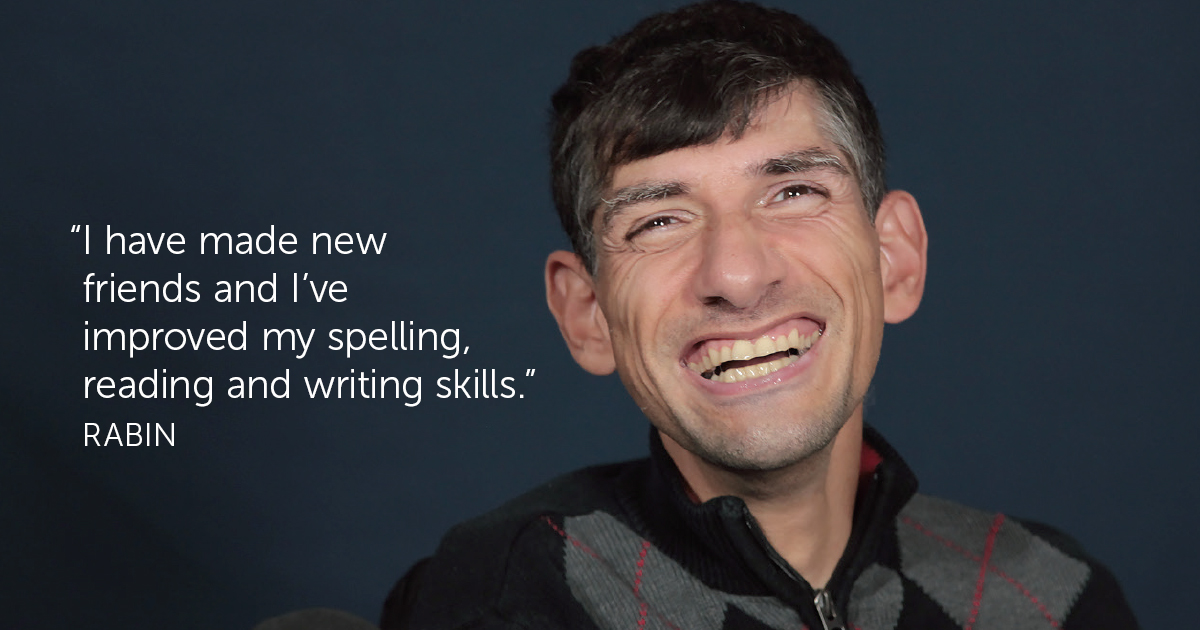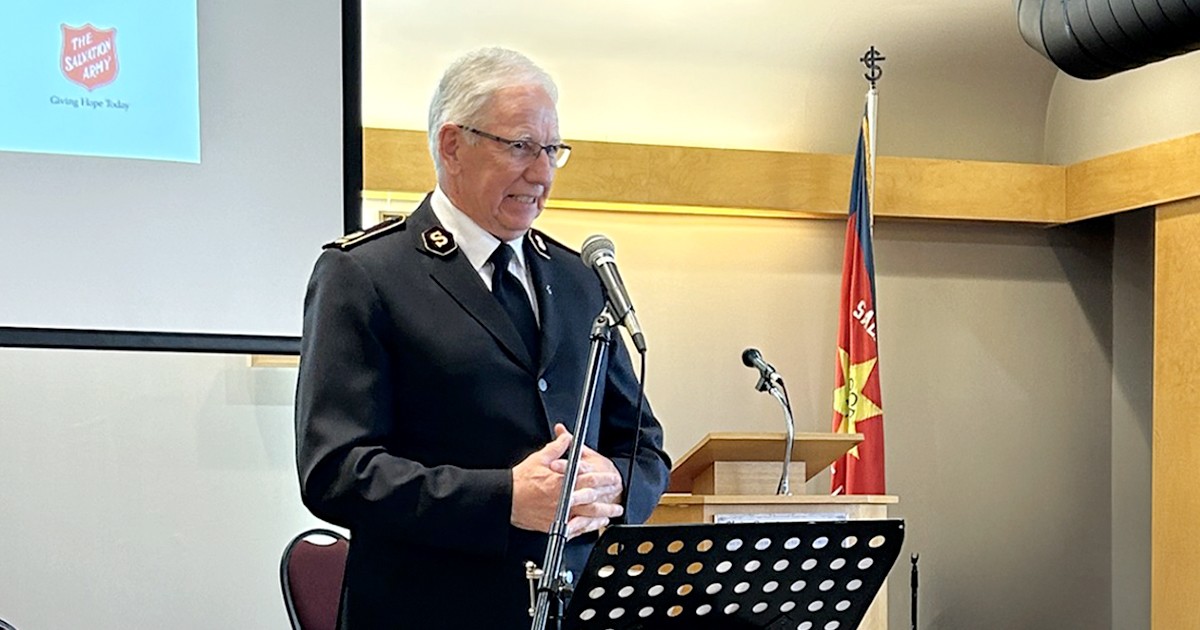“Never allow your disabilities or weaknesses to prevent you from achieving your goals,” says 45-year-old Rabin Betkhoodoo. “You have to look beyond your challenges to succeed in whatever you put your mind to.”
Born in Iran in 1976 and part of the Assyrian community, Rabin was diagnosed at birth with spastic quad cerebral palsy—the inability to control his legs, arms and body. Unable to speak, he eventually learned to communicate by using his toe to type on a computer. Today, with help from The Salvation Army, he is pursuing his ultimate goal—to use his graphic design skills in a small business of his own.
Early Life Challenges
Rabin’s inability to use his facial muscles and the core of his body meant he was unable to communicate with others.
“I couldn’t speak—even to my own family. Those were difficult times,” says Rabin. It was the inspiration he received by watching the bravery of his parents that encouraged Rabin to never give up.
“Resources to accommodate my physical challenges were unavailable in Iran,” says Rabin. “My father left his job and moved our family to Turkey, with the expectation that we would go to the United States, where medical help would be more readily available for me.”
Unable to immigrate to the United States, they remained in Turkey for two years. When they heard that Canada was open to the process, they moved forward with applications.
“To get an exit visa, I had to prove to health authorities that I was capable of counting and thinking for myself,” says Rabin. “At the hospital, I beat my father at dominoes five times!
“Our papers were approved.”
New Ways of Communicating
When they arrived in Hamilton, Ont., Rabin, his mother, father and sister didn’t understand English. His mother accompanied the 13-year-old to elementary school on his first day.
“My mother instructed me to move my head up and down, indicating yes or no,” says Rabin. “We had no idea what people were saying.”
The next day, therapists visited Rabin at school. He showed the team and his teacher that he could type using his right toe. A few months later, he was introduced to a “touch talk” computer. Before long, he was learning English and grammar. Rabin had always hoped that his condition could be cured through surgery. He wanted to walk and talk on his own. But doctors said that wouldn’t be possible. “I was extremely upset,” says Rabin. “The thought of never being able to walk or speak my language, Assyrian, was unbearable.”
Rabin spent one year in elementary school before high school; therefore, his English was limited. Fortunately, the “touch talk” had a dictionary that allowed him to compose whole sentences. Later, when he was introduced to a new speech-generating device, he could use his toe to verbally express whatever he typed on the keyboard.
“I wrote emails, stories and essays,” says Rabin. “I chatted with friends and played games on the internet.”
Achieving Lifelong Goals
At age 20, Rabin graduated from high school. He furthered his education at community college with a certificate in business applications for Microsoft Windows.
“I am extremely proud of my accomplishments and am confident that I can achieve whatever I put my mind to,” he says.
Rabin eventually went to PATH Employment Services for help with his career goals. Meanwhile, he became proficient in designing business cards, party invitations, flyers, posters and calendars. In 2016, he was introduced to The Salvation Army, and he enrolled in programs at its Lawson Ministries in Hamilton, which provides support and social inclusion to individuals with developmental disabilities and their families.
“I always receive encouragement from the staff at The Salvation Army,” says Rabin. “I participate in their digital arts program and, through weekly conversations, assistance and interactions, I have made new friends and I’ve improved my spelling, reading and writing skills.”
Staff at The Salvation Army ask Rabin to create cards for holidays and flyers for events. And they help him share and upload his work.
“Thanks to my parents who proved that giving up wasn’t an option and The Salvation Army’s willingness to come alongside me, I am well on my way to creating a business of my own. And it feels great!”
Born in Iran in 1976 and part of the Assyrian community, Rabin was diagnosed at birth with spastic quad cerebral palsy—the inability to control his legs, arms and body. Unable to speak, he eventually learned to communicate by using his toe to type on a computer. Today, with help from The Salvation Army, he is pursuing his ultimate goal—to use his graphic design skills in a small business of his own.
Early Life Challenges
Rabin’s inability to use his facial muscles and the core of his body meant he was unable to communicate with others.
“I couldn’t speak—even to my own family. Those were difficult times,” says Rabin. It was the inspiration he received by watching the bravery of his parents that encouraged Rabin to never give up.
“Resources to accommodate my physical challenges were unavailable in Iran,” says Rabin. “My father left his job and moved our family to Turkey, with the expectation that we would go to the United States, where medical help would be more readily available for me.”
Unable to immigrate to the United States, they remained in Turkey for two years. When they heard that Canada was open to the process, they moved forward with applications.
“To get an exit visa, I had to prove to health authorities that I was capable of counting and thinking for myself,” says Rabin. “At the hospital, I beat my father at dominoes five times!
“Our papers were approved.”
New Ways of Communicating
When they arrived in Hamilton, Ont., Rabin, his mother, father and sister didn’t understand English. His mother accompanied the 13-year-old to elementary school on his first day.
“My mother instructed me to move my head up and down, indicating yes or no,” says Rabin. “We had no idea what people were saying.”
The next day, therapists visited Rabin at school. He showed the team and his teacher that he could type using his right toe. A few months later, he was introduced to a “touch talk” computer. Before long, he was learning English and grammar. Rabin had always hoped that his condition could be cured through surgery. He wanted to walk and talk on his own. But doctors said that wouldn’t be possible. “I was extremely upset,” says Rabin. “The thought of never being able to walk or speak my language, Assyrian, was unbearable.”
Rabin spent one year in elementary school before high school; therefore, his English was limited. Fortunately, the “touch talk” had a dictionary that allowed him to compose whole sentences. Later, when he was introduced to a new speech-generating device, he could use his toe to verbally express whatever he typed on the keyboard.
“I wrote emails, stories and essays,” says Rabin. “I chatted with friends and played games on the internet.”
Achieving Lifelong Goals
At age 20, Rabin graduated from high school. He furthered his education at community college with a certificate in business applications for Microsoft Windows.
“I am extremely proud of my accomplishments and am confident that I can achieve whatever I put my mind to,” he says.
Rabin eventually went to PATH Employment Services for help with his career goals. Meanwhile, he became proficient in designing business cards, party invitations, flyers, posters and calendars. In 2016, he was introduced to The Salvation Army, and he enrolled in programs at its Lawson Ministries in Hamilton, which provides support and social inclusion to individuals with developmental disabilities and their families.
“I always receive encouragement from the staff at The Salvation Army,” says Rabin. “I participate in their digital arts program and, through weekly conversations, assistance and interactions, I have made new friends and I’ve improved my spelling, reading and writing skills.”
Staff at The Salvation Army ask Rabin to create cards for holidays and flyers for events. And they help him share and upload his work.
“Thanks to my parents who proved that giving up wasn’t an option and The Salvation Army’s willingness to come alongside me, I am well on my way to creating a business of my own. And it feels great!”
This story is from:










Leave a Comment